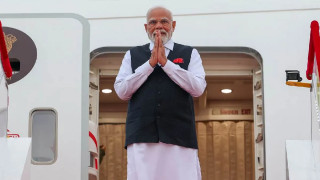
X/Canva
As the 2024 elections approach, the Bharatiya Janata Party (BJP) is gearing up for a highly contested battle to retain its hold on power. However, the road ahead is fraught with several significant challenges that could impact their chances. The past few years have seen a multitude of issues come to the forefront, each with the potential to sway voter sentiment and influence the election's outcome.
From economic difficulties and social unrest to controversial policies and environmental concerns, these issues reflect the complexities of governance and the diverse concerns of the Indian electorate. In this context, it is crucial to examine the seven key instances that might pose substantial challenges to the BJP in the 2024 elections, highlighting the multifaceted nature of these obstacles and their potential impact on the political landscape.
Persisting issues related to unemployment and economic growth could significantly impact voter sentiment in the upcoming elections. Despite the government's efforts to implement various economic reforms, the lack of visible improvement in job creation remains a pressing concern. Rural distress, exacerbated by inadequate support for agricultural sectors and fluctuating market prices, might also influence the electorate's mood. This ongoing economic malaise highlights the gap between policy intentions and on-the-ground realities, potentially eroding voter confidence in the current administration's economic management.
The government's response to the COVID-19 pandemic has been a contentious issue. The initial lockdown, while aimed at curbing the virus's spread, led to severe economic disruptions and hardship for millions, particularly among migrant workers and daily wage earners. Allegations of inadequate healthcare infrastructure, including shortages of hospital beds, oxygen supplies, and vaccines, further fueled public discontent. These criticisms reflect broader concerns about the government's preparedness and crisis management, which could influence voter perceptions and decisions in the forthcoming elections.
The prolonged farmers' protests against the three controversial agricultural laws, despite their eventual repeal, have left a lasting impact on the rural voter base. The protests, which saw large-scale mobilization and sustained resistance, highlighted deep-seated issues within the agricultural sector. In key agricultural states like Punjab, Haryana, and western Uttar Pradesh, the memory of these protests and the government's handling of the situation may continue to resonate, shaping voter attitudes and preferences.
The implementation of the Citizenship Amendment Act (CAA) and the proposed National Register of Citizens (NRC) sparked widespread protests and raised concerns about their potential impact on minority communities. Critics argue that these measures could lead to discrimination and marginalization of certain groups, fueling social unrest. This issue remains polarizing and could play a significant role in the upcoming elections, particularly in regions with diverse populations and strong minority communities.
Incidents of communal violence and religious polarization, such as the Delhi riots in 2020, have cast a shadow over the current administration's stance on social harmony and secularism. These events, marked by clashes and significant loss of life and property, have heightened fears of religious intolerance and division. Voters concerned with maintaining social harmony may scrutinize the government's track record on handling such incidents, potentially influencing their electoral choices.
The government's approach to environmental issues, including pollution in major cities and deforestation for developmental projects, has come under scrutiny. With air quality in cities like Delhi reaching hazardous levels and significant green cover being lost to infrastructure projects, environmentally conscious voters are increasingly vocal. The administration's commitment to sustainable development and effective environmental management could become a decisive factor for this demographic, particularly among younger voters and urban residents.
The perceived centralization of power and policies viewed as detrimental to regional interests have fueled discontent in states with strong regional identities. The abrogation of Article 370, which granted special status to Jammu and Kashmir, and the handling of concerns in northeastern states, such as the Citizenship Amendment Act (CAA), have intensified feelings of regional alienation. These issues underscore the tension between central authority and regional autonomy, potentially influencing voter sentiment in states where regional identity plays a crucial role in political allegiance.













Copyright © 2025 Top Indian News
